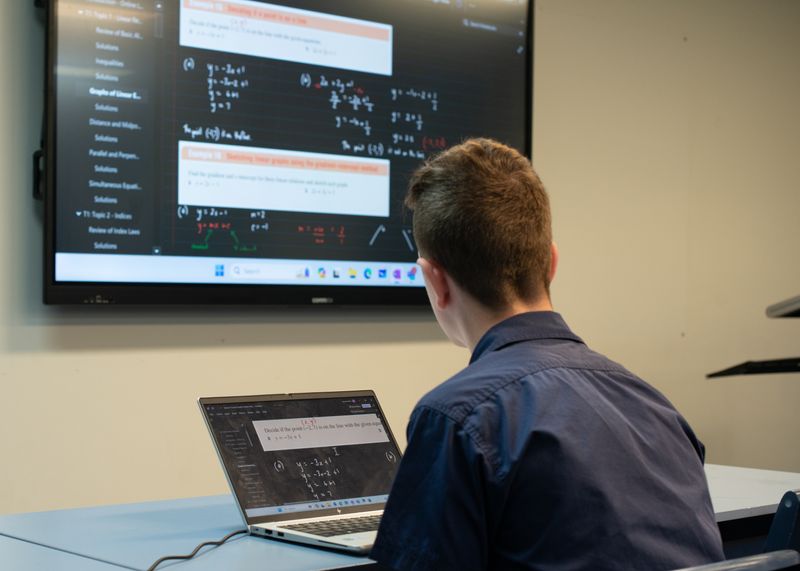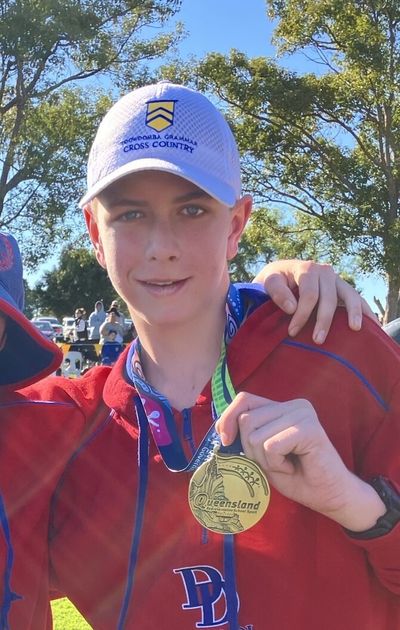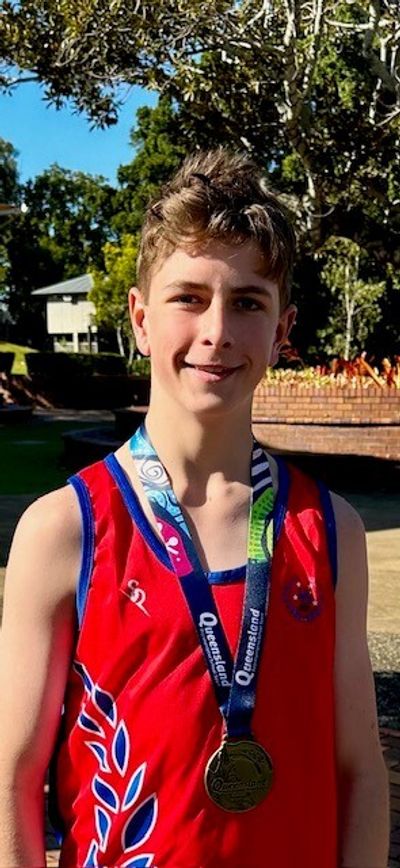“It didn’t really have a big impact on me,” said Mitchell stoically. My parents were much more upset than me; I just rolled with it.”— Mitchell Wilkes

Imagine being told that your world of colour was going to be dark in a few years, that you were slowly going blind.
That was the heart-wrenching diagnosis for Year 10 student, Mitchell Wilkes, right on Christmas in 2021. Mitchell’s mum noticed he wasn’t reading properly and had a gut feeling that there was something wrong with his eyesight. A trip to the optometrist revealed a thinning in the retina, and further tests showed that Mitchell had a genetic condition called Stargardt Disease, a juvenile macular degeneration illness that results in slow central vision loss.
Since then, Mitchell has lost a considerable amount of vision. He had 6/16 when he was first diagnosed and now sits at 6/60. There is a possibility that he could go completely blind by the age of 30, but if he’s lucky, he might retain some peripheral vision. He currently needs to look above a person’s head to see their face. He also adjusts the way he looks at everything to ensure objects are not in his blind spot. However, the details of objects tend to be blurry.
“The School and staff have been really supportive of my learning,” said Mitchell gratefully.
“Mr Ron Robinson and the IT department have put a lot of things into place to make it easier for me, providing me with a more powerful laptop, better access to devices and assistance with exams. I’ve also received great support from the Head of Department for Diverse Learners, Ms Amanda Gibson.”
“I have one classroom that has special equipment where the other students join me. All my classes except science and music are held in this room.”
Mitchell uses the default magnifier on his laptop and has a special iPad that zooms into the whiteboard at the front of the class. His teachers always check in to ensure he’s coping with the material. They also provide extra support when required, ensuring Mitchell has larger resized documents and worksheets. It’s these little things that have made the challenges at school much easier to cope with.

“The biggest challenge for me is mobility; crashing into things and not being able to recognise people until they’re really close to me, that’s really annoying,” said Mitchell.
“But I’ve got great friends here at TGS, and all the boys understand and work around my condition. They’re really good about it.”
Mitchell says his other senses have become heightened to compensate for the loss of his vision. His excellent hearing and exceptional memory are both particularly useful for his co-curricular activities. Mitchell is an avid musician, runner and mountain biker.
“I’m very slow and cautious on new mountain bike trails. I map them out carefully then memorise it so I can ride them normally next time,” said Mitchell confidently.
“My good hearing provides me with an alert system; I can hear other riders braking, which lets me know something is ahead. I love the challenge of mountain biking, going fast and free.”
Mitchell also loves running; he takes every opportunity to experience the sense of freedom it brings him. He trains five to six days a week for the TGS cross country team. He’ll walk the course beforehand, memorising the track to ensure he can confidently run it without tripping. Mitchell has also had huge success in aquathlon events thanks to the help of his guide runner, fellow TGS student, Alby Galbraith.
“I’m so grateful for his support,” said Mitchell.
“There is a 50cm tether between us. We run arm-in-arm, and Alby guides me. We won the multiclass division at both the state championship in Hervey Bay and the nationals in Perth in March,” Mitchell explained.
“It was a huge achievement, and I don’t think I could have done it without Alby.”

Mitchell’s great memory also serves him well in his musical endeavours. He plays the saxophone for the TGS Concert/ Show Band, sings in the Choir and the Grammarphones and also plays piano. The music staff have been extremely supportive of Mitchell’s challenges. They cut the music into very magnified chunks, which he scrolls through with a foot pedal when learning the track. After he has quickly memorised the music, he can play the piece without a score.
“I love to just sit and play music,” said Mitchell.
“I really enjoy it, and it just relaxes me. I’m so appreciative of the support and guidance of all the music staff at TGS.”
With only two years left at the School, Mitchell is already thinking about his future. He would like to be a drone pilot and study podiatry at university. With all his strength and determination, there is no doubt he’ll achieve his goals.
“My blindness is just part of me. I won’t let it stop me,” said the determined young man.
“From what I’ve dealt with, it’s way easier to take any challenges as they come and let them add to you rather than hinder your growth.”
Update:
Continuing with his great running form, Mitchell has won gold at the Queensland Cross Country State Championships in the Under 15 multiclass category at Bald Hills in Brisbane on Saturday, 13 July. It sees him now travel to the National titles at Yarra Glen near Melbourne where he'll compete from 20 to 23 August 2024. We continue to wish him all the very best!


Latest Blog
Embrace Every Moment
In the words of one of the greatest leaders of all time, Albus Dumbledore, “it does not do to dwell on dreams and forget to live.” The wise wizard spoke these words to Harry as he stood before the Mirror of Erised, a magical artifact that reveals one’s deepest desires. These words tell the story of the balance between our dreams and the richness of the present moment. We live in a world that often urges us to focus on our aspirations; , sometimes we get so lost in our dreams that we do not…
What is the TGS Athletic Development Academy?
As a TGS Old Boy (2003-14), sport has always been an integral part of my upbringing. As a young boy I discovered the joys of cricket, track and field and touch footy. This love of being active led me to studying Exercise Science at University and I was fortunate enough to work with a range of national and international level athletes, culminating in an internship at the Brisbane Broncos. This experience launched my career in the strength and conditioning space, allowing me to work with…
The Boarding and Day Family Connections
My husband Ben and I are four years into our boarding journey at Toowoomba Grammar School, we have two boys in Mackintosh House, Josh in Year 10 and Archie in Year 9, and a daughter Ella who is home with us for one more year before we become empty nesters. We are in the fortunate position that we live reasonably close, so we have the privilege of taking our boys home often and can attend most School events. For many of our boarding families, this is not the case, they live great distances away…
Streamline Success
Education is a transformative journey where the path we choose exerts a profound influence on our ultimate success. A streamed class is like an express locomotive: swift, efficient, and filled with eager passengers zooming towards their educational destination. Meanwhile, an unstreamed class resembles a motley group of hikers who accidentally wandered onto the wrong trail, stumbling and bickering as they struggle to find their way. Imagine the express locomotive of streamed classes, full of…
Reducing Stress: the Key to a Peaceful Life
Have you ever felt the soul-crushing burden of stress dragging your life through the mud? Ever had your precious time dwindled away at the hands of stress, while you are left powerless and alone? Well all this pain and anguish can be resolved in an instant; and all it takes is a change in the way we think. This alteration in brain chemistry is defined as mindfulness, the ability to obtain momentary awareness and recognition of our thoughts and feelings. Mindfulness is the key to defeating…
Gaining Ground with a Growth Mindset
I have seen the posters. I have sat the assemblies. I have watched the ads telling us about growth mindsets and how to develop one, and I'm sure you have too. But what we don't do is apply it to ourselves to help benefit our lives, however, there is no reason to blame yourself. The growth mindset is a deep topic that has many layers to it and is extremely important to have today. While we might blame other things on our weaknesses, it all links back to one thing – our mindset. To benefit our…
Sleeping Away the Mental Health Crisis
Two in five. That’s how many young Australians between the ages of 16 and 24 have experienced a mental disorder in the last 12 months (ABS, 2022). Let that sink in. Think of your closest five mates. Odds are that two of them are suffering right now from a crippling mental illness. According to recent studies conducted by the Australian Bureau of Statistics, Australia is witnessing an unprecedented rise in mental health issues among its youth, leaving them vulnerable and struggling (Headspace,…
Time for a Wake Up Call
Did you know that one in five 12–17-year-olds average over 8 hours of screen time a day? That means that in a 14-hour day, 57% of their waking hours involve looking at a screen! This madness is contributing to a very significant problem all teenagers face - sleep deprivation. It is killing us. We are becoming walking zombies rather than happy, growing lads. However, we can end this treacherous technological tyranny by putting down our screens before bed. Stop and think for a second. How much…
Breaking the Stigma
Strangling you in chains. Smothering you in despair. Anxiety and depression can be mighty beasts to break free from. Unfortunately, the state of traditional masculinity is reinforcing these chains. Mental health is a major threat to the well-being of men. This cage constructs barriers and borders which limit their ability to thrive in the modern world. Traditional Masculinity refers to a set of societal expectations foregrounded through the centuries by gender roles, stereotypes and beliefs.…